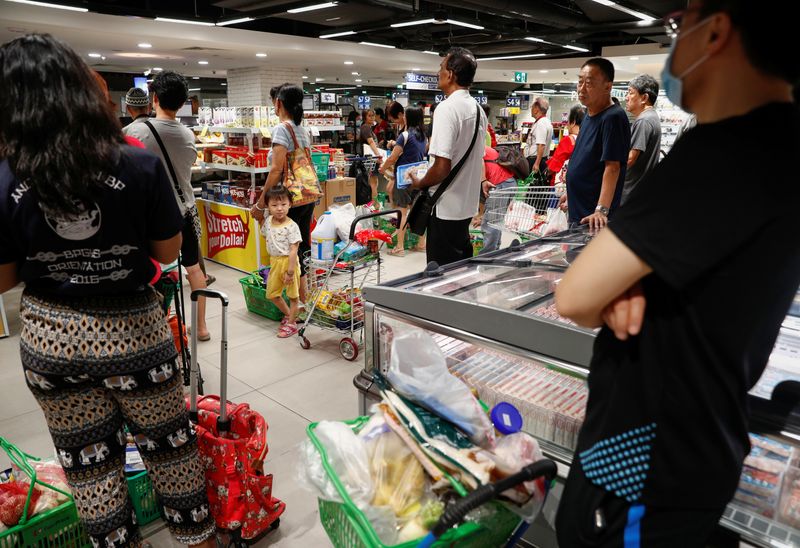By Fathin Ungku and Anshuman Daga
SINGAPORE (Reuters) - Singaporeans rushed to stock up on food on Tuesday amid fears of a disruption in supplies after Malaysia announced the closure of its borders to combat the coronavirus spread, though Singapore's government said there would be no shortages.
Malaysian Prime Minister Muhyiddin Yassin announced on Monday that Malaysia would shut its borders, restrict internal movement, close schools, universities and most businesses after its tally of coronavirus cases climbed to 553, the highest in Southeast Asia.
Muhyiddin said the order would take effect on Wednesday and last for two weeks.
Malaysia is a key source of staples for Singapore, which imports more than 90% of its food. Tens of thousands of Malaysians commute every day into the wealthy city-state to work in businesses from restaurants to semiconductor manufacturing.
"Who knows how long this shutdown will go on?" said one 70-year-old retiree loading up his supermarket trolley with packets of noodles.
"We have to stock up to some extent but what's the point of hoarding stuff. No use for everyone to be panic buying."
Long queues started forming at some Singapore shops on Tuesday morning, reminiscent of panic-buying a month ago when Singapore raised its alert response level on the coronavirus, although this time around store shelves were well-stocked.
Singapore has had 243 cases of the coronavirus, with no deaths.
Supermarket chain Fairprice started imposing purchase limits on essentials such as toilet paper, noodles, rice and eggs.
A shopper at another market told Reuters that chicken and pork had run out and prices of some vegetables had spiked.
'DIVERSIFYING SUPPLY'
A Singapore government minister sought to calm fears of shortages saying the country had stocks of proteins and vegetables for more than two months of normal consumption. Stocks of noodles and rice would last for three months.
"We have plans to manage this contingency, with a combination of stockpiling, building up our domestic production capacities, and diversifying our supply sources to many countries," said Minister of Trade and Industry Chan Chun Sing.
"While we may have to make some adjustments to our choices, we do have sufficient food supplies for all Singaporeans, so long as we buy responsibly," he told reporters.
Market traders reported brisk business.
Chicken vendor Win Hong said he would stay open for longer because of the unusually high demand. Fishmonger Anwar, who commutes into Singapore from Malaysia every day, said his sales were up 70% but he was not sure if he could come back to work on Wednesday.
Malaysia and Singapore, which separated in 1965 after a brief union following independence from Britain, have close economic ties. About 300,000 people a day move through two land checkpoints and over a strait between the two countries.
Some businesses in Singapore were drawing up plans to keep some Malaysian staff in the city-state for the duration of the border closure.
"I guess some will be staying in Singapore for two weeks while some like me may not have to. I saw people going with luggage bags this morning," said Zuwainah Hashim, a Malaysian engineer at a listed semiconductor company, who commutes into Singapore every day.

Companies that need help for with accommodation for workers could contact Singapore's economic agencies, which were working with dormitory operators and hotels, Chan said.